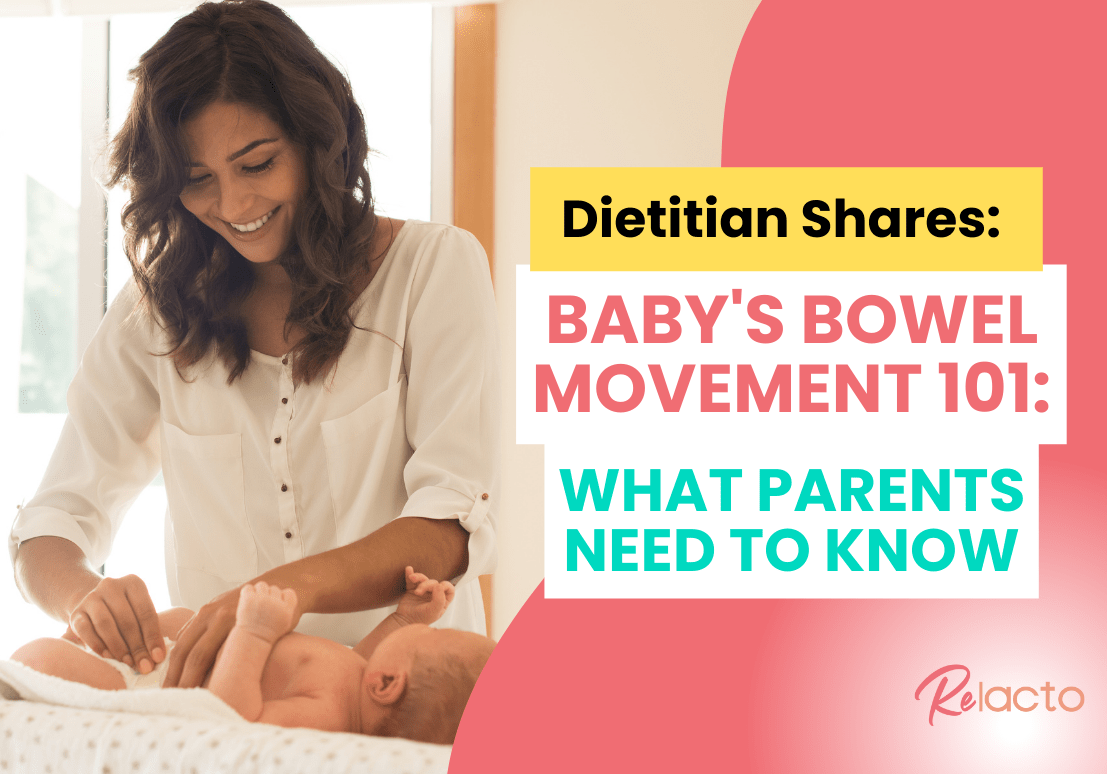Dietitian Shares: Baby’s Bowel Movement 101: What Parents Need to Know

Many parents very quickly realise that apart from breastfeeding, their baby’s bowel movement would be something they would be concerned about, too. Diaper-changing duties can feel daunting yet very informative to parents. For instance, one of the ways mothers and fathers know that their infant is feeding well is when the infant is able to make at least two soft yellow poos the size of 1 dollar coins every day, a few days after birth. They would also have increasingly more wet nappies every day, with at least 6 heavy ones every 24 hours.
In the beginning stages, a newborn may pass a motion with bowels of black or dark green colour. This is a type of baby poop known as meconium. The newborn starts digesting breast milk, the poop will turn yellow-green and eventually yellow in colour with a seedy texture like light mustard. If your baby is fed with baby formula instead of breast milk, the poop colour will become more yellow or tan with hints of green. The texture will be slightly more firm than poop from breastfed babies.
It’s understandable how many parents, especially first-timers, are worried about their baby’s bowel movement. Although it can give us an insight into what is going on, most of the time, we’re probably just being overprotective. Our baby’s bowel movement will come in different shapes, colours and sizes. However, here’s a few things you need to look out for.
Constipation
Your baby may be experiencing constipation if your baby is:
- Crying more often and looking uncomfortable before doing poo.
- Having dry, hard, pellet-like stools
- Passing wind often but does not poop
- Having a hard belly
- More irritated than usual
The most common cause of constipation in babies is due to inadequate fluid in the diet. Formula-fed babies are more prone to constipation than breastfed babies as the baby formula made may be too concentrated. It is also common to find your baby constipated for a few days when there is a change in baby formula.
Besides that, constipation can also occur in babies who are introduced to solid foods. If your baby is teething or ill, they may not eat or drink as well, thus having an increased risk of dehydration and lack of fluid intake and, subsequently, constipation.
Here are general tips that may be helpful in alleviating constipation in your baby
- Give your baby a warm bath as it helps relax the sphincter muscles in the anus.
- Gentle cycle their legs to stimulate bowel movement
- Give your baby a gentle tummy massage.
- If you’re breastfeeding, you may need to breastfeed more often to increase the fluid intake of your baby
- If your baby is formula-fed, it is best to double-check the ratio of water and milk formula during the preparation to avoid making concentrated baby formula for the baby. If all is good, it may be best to consider increasing his or her water intake slightly.
Diarrhoea
Diarrhoea is characterised by highly frequent, watery and loose stools. Babies can become dehydrated very quickly due to the loss of water and electrolytes from diarrhoea.
Your baby may be experiencing diarrhoea if he or she has:
- Large amounts of loose, watery stools
- Frequent passing of watery stools
- Becomes lethargic and irritable
- Bloated and hard tummy
- Vomiting and fever
- Reduced appetite
Normally, the cause of diarrhoea is a stomach bug by a bacterial or viral infection. For babies, it is occasionally due to food allergy, sensitivity or a reaction to certain medications.
It is best to seek professional help if your baby is experiencing diarrhoea. Only take anti-diarrhoea medication that is prescribed by your doctor. Until a thorough investigation and assessment is done by your doctor on your baby, mothers are encouraged to
- Increase the frequency of nursing to keep your baby hydrated.
- Provide oral rehydration to formula-fed babies for the first 24 hours, then reintroduce full-strength formula in smaller, more frequent feeds.
- Feed your baby electrolytes to rehydrate more effectively
- Change your baby’s nappy frequently and use nappy cream to reduce irritation.
Other tips to note if your baby is experiencing diarrhoea is to not give any medication to reduce it unless it is prescribed and recommended by your doctor. Besides that, if your baby is formula-fed, ensure the bottles are sterilised properly to avoid the risk of reinfecting your baby with a bug or viral infection.

If you continue to be concerned about your baby’s bowel movement, take a photo to show your healthcare professional. Keeping a diary of the dates and times that your baby passes motion is also very helpful.
If you have a family history of any food allergies or gastrointestinal conditions and suspect that the baby’s diarrhoea is because of certain types of food you are eating as you breastfeed, then do record it in the diary carefully.
Meals for lactation or lactation drink that you are consuming would have to be tweaked accordingly. In such situations, where you still desire to breastfeed your baby exclusively, then working with a Dietitian who specialises in food allergies to assess and plan the best meals for lactation specifically for you will be very beneficial as it would help you avoid these triggering foods while still providing you with a meal plan that nourishes you and your baby adequately.







